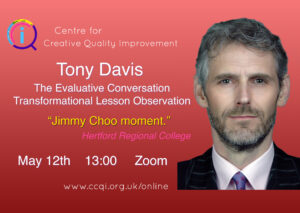Your organisation’s culture?

Where do you feel the ‘culture’ of your organisation comes from? Is it the leaders, the staff, the governors, the learners? While everyone plays their part, I’m not sure it’s any of the people, as they change so often. All of us in the LinkedIn community can testify to that, given the number of It’s-been-a-blast-but-I’m-off-to-pastures-new posts. So I think it comes from somewhere less volatile (or, at least, somewhere that should be less volatile..). I think culture is set by the way we observe our staff. This is what we’re going to be looking at in next week’s open session, Friday May 12th: The Evaluative Conversation: Transformational Lesson Observation. More details here: www.ccqi.org.uk/online-and-in-person/the-evaluative-conversation.
Have you ever really considered the conceit you buy into with Ofsted inspectors? It’s this: when the inspector feeds back, they are right. Aren’t they. Aren’t they? Grounds for appeal don’t include challenging inspectors’ judgements..
But they don’t know your learners, they don’t know what’s happened in the months, weeks and days before the observation, they don’t know what happened in the first hour of the lesson, or what’s coming up in the last hour. So of course, they aren’t ‘right’. That’s not to say there isn’t value in what they have to say, but in placing themselves on this incredible pedestal, something dreadful happens. And this ‘something dreadful’ happens if we, as observers, play at being Ofsted inspectors, too.
This hierarchical approach, this ‘I’m right, you’re not’ approach, allows teachers to go into denial; whether the observer is right or not. This ‘denial experience’ is enormously powerful and extremely damaging. I’ve had teachers tell me, in very great detail, about these types of feedback experiences that happen 15, 20 years ago. And they’re still smarting.
A lot of people think the two types of observation system are: graded or ungraded, but this isn’t the case. The two options are: accountability or learning. A big shorthand for ‘accountability’ is that something will happen to some and not to others. In other words, some might be ‘supported with coaching and mentoring’, while others are not. In other words, some failed their observation and some didn’t. Even though there are no numbers, this is still grading and accountability.
But what we need is to ensure that no teachers ‘go into denial’. And, of course, the system has to be firmly about learning; otherwise what on earth is the point.
It’s surprisingly straightforward to avoid denial syndrome (though note that I didn’t say easy..). All you need to do is not feedback. Avoid putting yourself on a pedestal. Give no opportunity for denial.
In next week’s open session, delegates will be finding out whether this is easy or hard. They’ll leave the session having completed a number of observations and evaluative conversations, and they’ll know what they need to do next if they buy in to this approach. It’s not just the right thing to do, it’s a wonderful thing to be a part of. Here’s what others have said about the session:
- ‘Highly motivated and inspirational. It has been quite a while since I have felt inspired to ‘create a new culture’.’ Abingdon and Witney College
- ‘Today was stimulating because the ideas challenged much of my thinking.’ Banbury & Bicester College
- ‘Extremely useful session which has allowed me to question the validity of our organisation’s OTL system.’ Bracknell Open Learning Centre
- ‘I started as a half-empty bottle and ended up overflowing with new ideas and desire to put into practice.’ East Coast College
And my favourite:
- ‘Jimmy Choo moment.’ Hertford Regional College
More here: https://www.ccqi.org.uk/uPZV1
Do please join us if you can and tag any of your colleagues who might be interested, and/or share with your own networks if you’re able. Friday 12 May, 1pm https://www.ccqi.org.uk/evaluative-conversation.




Comments
No comments yet